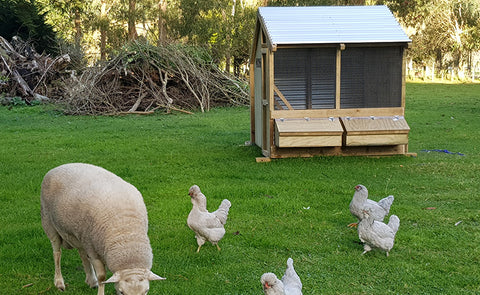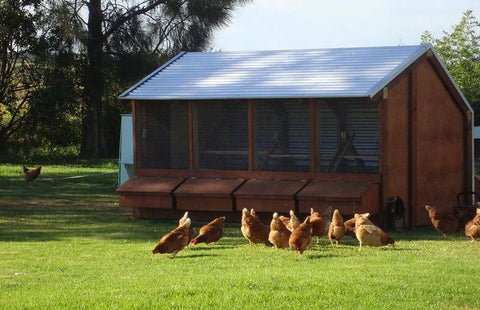Have you been imagining collecting your own fresh daily eggs and enjoying the idea of a peep of chickens hanging out in the backyard? Then you’ll need to invest in a fully functional coop.
Chicken coops come in various shapes and sizes but every chicken coop should include a safe enclosed area, proper ventilation, nesting boxes, a roof and roosts or perches. Your chickens will also need some outside space to get exercise and fresh air whether in the form of free-range, a run or pastured.
The idea of creating a farm to table experience in our own homes is an appealing idea, but it comes with a variety of learning curves and some extra responsibilities. No worries, we have some helpful tips to help you on your way. Let’s see if you’re up to the challenge.

What do Chickens Need?
As with all animals, a chicken has necessities beyond basic food and water. To give your chickens the best quality of life, you’ll need to consider their safety, comfort, hygiene, peace of mind and their need to express natural behaviour.
If you have the space and the security to house some free range chickens then for sure this will be the best outcome all around. However, not everyone can guarantee the neighbourhood wild cats, stoats or ferrets won’t be tempted to come knocking once they hear of your new residents on the grapevine, not to mention how excited the neighbours dog will be to see them.
Make sure all large openings are covered with some wire and any small openings are blocked or covered. Any gaps and holes could be opportunities such as rats or other small rodents to work their way inside.
Needless to say, creating a safe, warm, spacious and cosy coop will keep your chickens happy and healthy year round and it doesn’t mean they have to be ‘cooped’ up all day everyday!

What Do You Need In A Chicken Coop?
Roosts
Before we farmed such animals, a chicken's natural instinct would be to perch on branches at night, to stay out of reach of predators while they slept. The younger chicks will need to learn this instinct so some smaller and lower perches will encourage this.
Don’t place your roosts too close to the ceiling to avoid your chickens head butting it when they fly up to roost and avoid PVC plastic as this can be too slippery for sleeping on. Remember that chickens that nest on the ground are more prone to disease and parasites.
Nesting boxes
Another natural instinct for chickens is to seek out a secluded, concealed space with good visibility for nesting. Raise some boxes with three sides and a roof slightly up off the ground and line them with some comfortable bedding, such as pine wood shavings, straw, hay or recycled shredded newspaper.
You can be creative when making your nesting boxes, milk crates, old shelving or wine boxes can make great nesting options. The more private they are, the more likely they’ll use them but don’t be offended if you find them laying their eggs elsewhere, they’ll find what they’re comfortable with. Make sure to regularly change their bedding to keep it clean, dry and free of parasites. Check out our tips for cleaning your chicken coop.
Scratching area
Chickens naturally scratch and peck at the ground to hunt for food and this is usually how they spend the majority of their days. Chickens can become agitated and bored without fulfilling this natural instinct so it’s helpful to scatter some grain in the bedding or on the ground in their run for them to scratch at throughout the day.
Dust bath
Creating a dust bath within the coop or a covered run means they can clean themselves whenever they need to while keeping the area dry, clean and sheltered. Chickens enjoy rolling in dust every few days as it helps them stay clean instead of using water. This behaviour encourages healthy feathers as they have a preen gland close to their tail which helps them to clean and oil their feathers while they preen themselves. It also helps to protect them from red mite infestations.
Check out our DIY Old Tyre Chicken Dust Bath Guide
Sunning area
Much like humans, chickens gain their much needed vitamin D through sun penetration. They also enjoy spreading their wings out in the sunshine. Preening, dust bathing and sunbathing are all group activities so you’ll need a space big enough for your whole flock for these purposes. A sheltered area inside the coop with adequate dust such as dirt, sand, peat or wood shavings and a clear roof will suffice for this.
Ventilation
Chickens create a lot of dust and manure, this, along with their bedding, feather shedding and all the scratching they like to do means fresh air is a necessity for healthy breathing.
With this in mind, you don’t want the coop too draughty, leaving some space around the eaves of the roof or the coop windows is ideal for creating airflow. It can also let the moist air out and dry air in during the winter months. Just ensure you secure the openings with chicken wire to deter any predators.
GET A FREE COPY OF OUR CATALOGUE
How Big Does a Coop Need to be for a Chicken?
Chickens are social animals, but like many of us, they still appreciate some personal space. This helps them to avoid aggression with each other and allows some quiet time to recoup. They’ll also need enough room to stretch and flap their wings so you’ll need to account for this, depending on the number of chickens you decide to house.
Remember to consider the future size of your flock, how big they will grow or whether or not you may add to your chicken family in the future. You will likely encounter health issues if your coop becomes too crowded. Diseases, parasites and behavioural problems such as feather picking may occur if your chickens are on top of each other.
Ten square feet of outdoor space per chicken is ideal but the truth is, the more space you can provide the happier your chickens will be. Your coop should include roosting bars (AKA perches) which preferably would be twenty to thirty centimetres per medium sized bird (more if they are larger) to enable healthy sleep at night, especially as some hens like to peck at their neighbours.
Your nesting boxes will ideally be thirty centimetres squared and around forty five centimetres high for medium sized laying hens. If you can, provide several boxes so the laying hens have a choice and somewhere else to lay should some be taken up.

Should a Chicken Coop Be In Sun or Shade?
Chickens are sensitive to temperature so one of the main things to consider when taking in some feathery friends is where to place your chicken coop. Living in a country with four distinct seasons such as New Zealand we need to consider both the hot summers and the cold winters.
The good news is that where hot coops are difficult to cool down, cold coops can be warmed up. Therefore your chickens are most likely to prefer a coop that is built in the shade that can be warmed up in the winter. Chickens generally suffer from heat more than they do from the cold.
Choosing a relocatable coop that can be moved into the sun for the winter and back into the shade for the summer is the perfect solution. Outpost Buildings chicken coops are designed to be easily relocatable, keeping your chickens at optimal temperatures year round while giving them fresh ground.
Do Chickens Need a Run?
Your chickens will need a place to venture outside and room to run around for part of the day at least. How you accommodate this will likely depend on where you live and the types of predators you have around.
Your options for a chicken run are between:
- Free-range - if you’re lucky enough to have a rural property large enough and free of predators.
- Pastured - If you have a backyard or fenced off area where they can run free for part of the day.
- Enclosed run - if you live in an urban or suburban area or have a problem with predators an enclosed run might be your best and safest option.
Why Are Chicken Coops Off The Ground?
Most chicken coops are built on legs or skids and raised off the ground. This can benefit you and your chickens for many reasons:
- To protect against burrowing predators, rodents and stoats who may eat your chicks, eggs or transmit diseases.
- To keep moisture at bay from run-off, seasonal floods or certain types of soil that don’t drain well. Moisture can cause mould, rot, dangerous bacteria or decaying floors which not only spreads disease, it can also cause frostbite in your chickens.
- To prevent your coop from being snowed in.
- To allow for air circulation to regulate the coop temperature.
- To extend the life of your coop flooring.
- To add area to a chicken run which can extend underneath the chicken coop, it can provide shade during the summer months and shelter during the cooler months.
- To make your coop easier to clean by scraping the bedding out into a wheelbarrow or a bucket.
- To make egg collection easier as the coop will be higher for you to reach.
If you have any additional questions, check out our guide to Keeping Chickens in NZ for more information.
Also, feel free to contact us if you find an Outpost Building Chicken Coop that looks perfect for your home.





